#and not about the systems in which these people operate
Note
Idk if it’s cause his face claim is Oscar Isaac but Ciro is taking up way more of my brain space than I think you intended. do u have any of his lore in your back pocket? a tragic backstory? who he had his kid with? were they in love?? IS HE HAPPY? anyways. i appreciate you and i hope you’re doing well!! sending love
Thank you so, so much! I'm starting to feel a bit more up finally, and my moods are leveling out I think!
And ABSOLUTELY! TEN PIECES OF CIRO LORE:
Ciro and his wife Elisa (Sophia's mom), were a Mobster Power Couple, and madly in love. She worked alongside him and ran various aspects of the business. She was cunning yet cheerful, loved classical literature like he did, and they had plans for a large family. They both figured if one of them died, it would be due to 'business'. Sadly she passed away incredibly suddenly from an aneurysm a few years after Sophia was born, leaving him a widower and a single father. His daughter for a time was the only thing keeping him going.
He's made a good recovery since then with some therapy and has found he loves being a dad and is quite happy running his businesses, criminal and not, though he spends a substantial amount of time worrying about Jane, and would be even happier if she were safe. But he definitely feels like he's doing what he was meant to do, and feels like God approves in his own way.
Romantically (something rarely touched on in TRT), he's had some flings and short-term relationships with various people after his wife passed, mostly women and a few men, but he hasn't had anything serious so far, in part because he's been so focused on Running The Empire and raising his daughter(s) (and other adopted stray feral murder children like Eli). Though if he finds his second special person, he'd be willing to consider something more serious.
At the time of TRT, he has five cats, all former strays because this man can never resist picking up the lost, human and animal, and there are a variety of cat rescues around Los Angeles that find themselves mysteriously funded by an anonymous donor.
He's decent at guitar and piano!
In TRT the incident where his childhood dog was killed by a boar is mentioned. In his attempts to rescue his dog, he got thrown aside into a tree - that injury caught up with him later, which is why Matt notices arthritis in his knee and an altered stance when scanning him over!
Ciro and Natasha Romanoff know each other through (sketchy) business and are on friendly terms.
He's the eldest of his siblings (1 brother and 2 sisters).
He didn't always plan on being a crime lord but after running face-first into some governmental/legal corruption as a teenager, his thought process was roughly along the lines of, 'I could do better than them.' He likes to think he's kept his promise - there are a surprising number of people in his city, especially in certain neighborhoods, who tend to look to the Ferryman's justice and authority first over the police or legal system. His punishments are often cruel, hard, and unforgiving, but if you follow his laws and keep your mouth shut, you generally don't have much to worry about, and because he minimizes collateral damage and invests in the neighborhoods (to encourage loyalty if nothing else), most are happy to look the other way.
He 'introduced' himself to SHIELD by mailing a few specific agents the tongues of HYDRA operatives, complete with coins, after those operatives attempted to Fuck Around in Los Angeles and quickly Found Out. One of those SHIELD agents happened to be Phil Coulson. The two have a bi-yearly, location-randomized coffee meetup, which is how Ciro wound up with Agent Thompson's card after Coulson vouched for her record!
#ciro leone#i love ciro and i have a mountain of backstory on him and basically no place in the story so it just sits here#in my head#i fully plan if i turn TRT into an AU book series one day#tehre will be a book or two JUST for Ciro because he deserves one#the red thread
37 notes
·
View notes
Text
.
#It’s kind of wild to see how people talk about mizrahim and the beta israel on here. Like.#people are Just Now discovering that people(s) who are colonial subjects#which they are#as much as anyone else from the mena region#can also perpetuate and have conditional gain within colonial systems#and there’s like… no awareness of how that works over and over again in colonial and immediately post-colonial societies#When in fact one of the most basic structures of colonial power#is pitting colonized peoples against each other through the construction of elaborate unstable racialized hierarchies#like#I think the thing it drives home for me#is how many people in the west a. Operate off of a purely binary moral framework#in which oppressed is good and oppressor is evil and no one is both#And b. Don’t know enough about the histories or current realities of the colonized world to draw meaningful conclusions about anything#And also c. Don’t know shit about Jews#of course#but especially non-ashkenazi Jews#it’s easier to view Israel as the embodiment of the sin of western colonialism#than to genuinely unpack and understand the structures that comprise it#and the ways in which they truly aren’t unique#and the sheer horror of that reality!#Y’all absorbed one (1) idea from fanon and really just stopped there huh#Anyway. The closest parallel to Israel in the world isn’t Algeria#that’s just the only one y’all know about because fanon wrote about it.#the closest parallel is maybe Liberia and that’s sure something to think about
9 notes
·
View notes
Note
on a srs note talking about what literally caused us to divorce i unfortunately agree with you on most of your reasons for disliking soulmate aus AS MUCH AS I WANT TO DISAGREE.... i think theres so much lore writers can explore that most just choose not to but sometimes when they do it can come across heavy handed TO ME personally. so i usually like to fill in the gaps myself and it satisfies me for the most part even though it can be better to have textual information about the lore most of the time. i think the idea of having a Person that completely and wholeheartedly is made to accept you or at the very least has to acknowledge your existence in some way is really appealing to me because of my own Issues. and just the idea of finding something/someone thats perpetually "lost" is cool to me and if its a good fit thats great but if not i like the takes where you can make your own happiness more than oh not having a bond is tragic and you cant have a fulfilling life because youre not with your soulmate. i heavily disagree with that notion of true love in that specific sense and sometimes i think the existence of aro/ace/polyam even bi or questioning people really breaks the idea of a one true soulmate youre bound to for life a lot of fics seem to have. then it gets complicated with the ideas of predestination and fate but whatever. i really agree with you on the development over initial connection aspect too its why im more of a fan of writing on skin before meeting or shared dreams or thoughts more than having matching marks or timers or bumping hands and suddenly theyre the one because they literally brought color into your world its just not super realistic relationship wise. but they can be done really well which of course you know that and i should not have divorced you over it but to be fair if i did know your reasons i wouldnt have said that we shouldve divorced. but im sorry and can we please make out
oh wow so basically i was literally right just expressed it in an honest way. Vindication at last. we are so making out rn
#the thing about wanting someone willing to see/accept you is Valid i think like i have no issues with it as a way to see romance but when it#becomes a system rather than a personal belief on how the world operates it opens the struggle of how many people Such as me think that lov#is actually through actions and no preconceptions. And that in turn becomes into a question of what is an acceptable or unacceptable#way of being in love Specially in queer circles which you mentio perfectly#anyway as i said earlier its just like unless its made by an author i Trust i wouldn't pick soulmate aus as something to read generally BUT#DONE WELL IT CAN SRSLY SLAP#star asks
2 notes
·
View notes
Text
I love men who love obscure shit it’s so nice to google the most specific combination of things hoping it’ll work out the way I want and some guy will be like ya! It works! I did it like this! Or no, but here’s this thing that has the functionality you need that does slightly better than what you’re looking at that’s not like that much more expensive considering the trouble of syncing your shit with a script being a total pain in the ass
#I love retro emulation so I have several men I have a deep respect for#I googled if I could cloud sync the saves folder with a specific handheld#the answer was no it’s not got Wi-Fi so it can’t do it automatically#HOWEVER! there’s a better handheld like what I found that has wifi and the same kind of stuff like custom operating systems that other#niche weirdos made to make the handheld work better#I love the bootleg gameboy people#it can handle ps1 and backwards plus some ds and n64 and psp#the model I want anyway the super basic ones can do ps1 and back#I just want portable apotris (customizable Tetris) and the various romhacks I’ve found and love deeply#also due to being either not born or under 6 years old#I never have played the games I found and thought I’d like#like a massive amount of classic jrpgs like the first 8 final fantasies I’d say 9 but I have beef with 9#plus a ton of fan translated classics#also there’s a guy on YouTube who just reviews and does technical guides for like 90% of these devices#and taught me retroarch I hold him in high esteem#I’m gonna retrain myself on the steam version of the program so I can plonk it into my frontend better and have cloud saves#it has made me so brave about digging into program files which no is not scary at all
4 notes
·
View notes
Text
I love aokiji from one piece. Hes my little swimbly bimbly
#i like him a lot. i love how one piece gets a lot of morally gray antagonists#like. aokiji is kind of a really good guy in certain moments.#like he cares a lot about civillians . he just works inside of a really shitty system . hes like the idea of a ‘good’ cop#who like joined the marines with the intent of helping people but he does more harm than good .#i think it makes a lot of sense for him to have quit after the time skip. i know hes rolling with the blackbeard pirates now though#which is weird to me. bc that doesnt seem to suit his ideals. i think he’ll turn out to be undercover or some shit or a sword operative#im excited to learn more abt sword bc its apparently really important in the manga rn#but im not caught up so it’s just like. a vague thing i know now#*thinks about robin backstory* dereshishishishishi…..#also it makes me so mad how oda does so many of his black characters bc. aokiji is right there. you know how to draw black people#give that same treatment to usopp!!! or blackbeard. its lame. it sucks#related. hes a minor antagonist but i wish they did more with mr 5. hes another black character with a good design (at least in the manga)#the anime kind of connects the corners of his lips and makes them look bad but in the manga its natural yet still cartoony#he has such an underutilized devil fruit too T_T he can basically explode any part of his body.#and its usually used in the form of flicking exploding boogers at people (funny) but i was expecting him to get a cool moment where he just#fuckin. BOXES someone with explosions and some cool kicks. sadly we never get that though
4 notes
·
View notes
Text
i DO miss playing video games but i am pretty sure if i tried to run one on my computer now she would sprout legs and run away
#i didnt ever play a lot of tf2 except to claim the dangeresque shades but i did unfortunately play a lot of overed watch#which i regret to say even though i just played practice modes bc playing against real people scared me i did like#it WAS fun...i WOULD like to get into tf2 in the year 2022 maybe...but i doubt it would be possible#i would love to play games but i can't get a new computer and an operating system that isnt windows 7 </3#i just know they get worse from here and less things are compatible with it and i dont know how to install(?) it myself...#it is probably going to bite me eventually but i just get so mad thinking about computers! there never needed to be an operating system#after this! ack! i hate the march of technology i hate it i hate it i hate it never mind im mad now and i cant even play a game#to distract me. truly this is the worst thing that has ever happened to me.
7 notes
·
View notes
Text
Hello looks to the moon fans. I am gently placing drowning act by friends unseen into your hands 👍
#rat rambles#I remebered this song exists which means Im thinking abt rain world and moon again god I love moon sm#shes literally so me bait idk how to explain how she is but she is just trust me bro#shes so messed up I love her so fucking much only character in this game that comes back to haunt me regularly#oh and also sliver but y'know thats partially because of oc stuff moon makes me want to maul people#moon is like. what if you made a guy who gets basically killed by her brother and then has to live and think in her own rotting corpse#shes not even a zombie shes just a living brain in a corpse that was never able to move in the first place#and before all of this she was very aware that she was dying and it scared her she was so scared#but even still in her last message to the closest thing to a family she could ever have is message of comfort to them#her last line in said message was 'Im glad Im not alone'#and its not true. she is alone. no one had been able to contact her in ages. soon enough even the remnants of these people will be lost.#and she has to live with fragmented memories and no access to the rest of her bodily functions for god knows how long#all while being so painfully Alone#its only worse when you think about how much more deafeningly silent it must be to her as shes yknow. a supercomputer.#this isnt just her losing access to her body shes lost access to most of her processing systems too#shes only held in consciousness by five braincells which were never meant to be used as an iterators sole operating system#and even outside of that she used to be a giant wirring machine and now its just. quiet.#she doesnt even see that much wildlife her only company is the water that she once so desperately needed#and she still puts on a strong face. she still tries to live in what little ways she can.#💥💥💥💥💥 I hate her
1 note
·
View note
Note
What do you mean by Venus floating cities?
I'm hoping to write a science fiction story about visiting Venus as part of the space race and I would love your input
Alright so the thing with Venus is that we're all very familiar with her horrible hell-death clouds and 900°F surface temperatures. We all understand the surface of Venus is not a fun place for humans to be.

But, nobody ever talks about the fact that ABOVE the hell-death clouds, Venus is a paradise. The most Earth-like environment we know of in the solar system, beyond Earth itself, is actually in the skies of Venus.
About 30 miles above the surface, the pressure is ~1 atmosphere, and the temperature ranges from 30 - 100°F, which is Happy Human™ standard pressure and temperature.
What's more, a breathable mix of oxygen and nitrogen provides over 60% the lifting power on Venus that helium does on Earth. In other words, a balloon full of human-breathable air would float to the habitable range of Venus's atmosphere. We could float a ship with the very air we breathe.
The other great thing about this is that it avoids one of the big problems with Mars colonization. On Mars, any habitat on the surface full of breathable air is vulnerable to leaks and explosive decompression, a la the Martian.

Floating on Venus, a balloon full of breathable air doesn't have a significant pressure difference between the inside and the outside. Which means, any leaks or tears would be very slow and manageable. You could fix that shit with duct tape!
Similarly, because the environment outside the balloon is so Earth-like, humans living there wouldn't need any big fancy pressurized suits for extravehicular work. We'd need air to breathe, maybe some heat protection, and protection against the acid rain. That's it.
Venus also provides the tools to keep us fed! It's atmosphere is made primarily of carbon dioxide, even above the dense horrible clouds. What likes carbon dioxide? Plants from Earth!! Lets grow FOOD on FLOATING PLATFORMS in the SKIES of VENUS.
This whole idea actually came out of a NASA effort exploring potential Venus colonization. The program was called HAVOC - the High Altitude Venus Operational Concept.
It hasn't really gone anywhere, and as far as I know there are no real plans to revisit it. Unfortunately, from a practicality standpoint, Mars is a much more viable target for human colonization. Not only is it better poised for outer solar system exploration, being farther away from the sun, but living on Venus would come with too many complicated contingencies. In the event of a major failure on Venus, you'd need to fly to another base, or fuck off all the way to orbit. I understand why people aren't really in a hurry to live somewhere where landing on the surface means certain death.
But that doesn't mean I won't be forever and always enamored by the skies of Venus. Here's one of the artist concepts to come out of HAVOC.

I want to be there.
#venus#nasa#space#space exploration#HAVOC#blimp#spost#venus my beloved#single most underrated planet#asked and answered
7K notes
·
View notes
Text
Kickstarting a book to end enshittification, because Amazon will not carry it

My next book is The Internet Con: How to Seize the Means of Computation: it’s a Big Tech disassembly manual that explains how to disenshittify the web and bring back the old good internet. The hardcover comes from Verso on Sept 5, but the audiobook comes from me — because Amazon refuses to sell my audio:
https://www.kickstarter.com/projects/doctorow/the-internet-con-how-to-seize-the-means-of-computation
Amazon owns Audible, the monopoly audiobook platform that controls >90% of the audio market. They require mandatory DRM for every book sold, locking those books forever to Amazon’s monopoly platform. If you break up with Amazon, you have to throw away your entire audiobook library.
That’s a hell of a lot of leverage to hand to any company, let alone a rapacious monopoly that ran a program targeting small publishers called “Project Gazelle,” where execs were ordered to attack indie publishers “the way a cheetah would pursue a sickly gazelle”:
https://www.businessinsider.com/sadistic-amazon-treated-book-sellers-the-way-a-cheetah-would-pursue-a-sickly-gazelle-2013-10
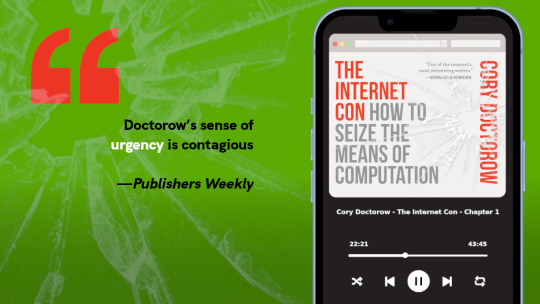
[Image ID: Journalist and novelist Doctorow (Red Team Blues) details a plan for how to break up Big Tech in this impassioned and perceptive manifesto….Doctorow’s sense of urgency is contagious -Publishers Weekly]
I won’t sell my work with DRM, because DRM is key to the enshittification of the internet. Enshittification is why the old, good internet died and became “five giant websites filled with screenshots of the other four” (h/t Tom Eastman). When a tech company can lock in its users and suppliers, it can drain value from both sides, using DRM and other lock-in gimmicks to keep their business even as they grow ever more miserable on the platform.
Here is how platforms die: first, they are good to their users; then they abuse their users to make things better for their business customers; finally, they abuse those business customers to claw back all the value for themselves. Then, they die:
https://pluralistic.net/2023/01/21/potemkin-ai/#hey-guys
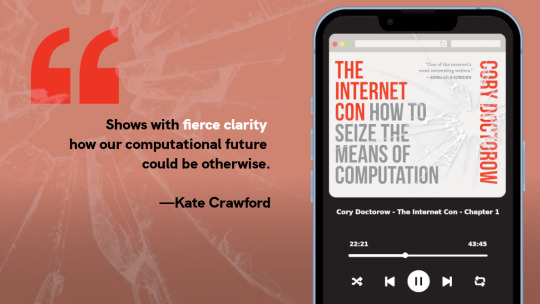
[Image ID: A brilliant barn burner of a book. Cory is one of the sharpest tech critics, and he shows with fierce clarity how our computational future could be otherwise -Kate Crawford, author of The Atlas of AI”]
The Internet Con isn’t just an analysis of where enshittification comes from: it’s a detailed, shovel-ready policy prescription for halting enshittification, throwing it into reverse and bringing back the old, good internet.
How do we do that? With interoperability: the ability to plug new technology into those crapulent, decaying platform. Interop lets you choose which parts of the service you want and block the parts you don’t (think of how an adblocker lets you take the take-it-or-leave “offer” from a website and reply with “How about nah?”):
https://www.eff.org/deeplinks/2019/07/adblocking-how-about-nah
But interop isn’t just about making platforms less terrible — it’s an explosive charge that demolishes walled gardens. With interop, you can leave a social media service, but keep talking to the people who stay. With interop, you can leave your mobile platform, but bring your apps and media with you to a rival’s service. With interop, you can break up with Amazon, and still keep your audiobooks.
So, if interop is so great, why isn’t it everywhere?
Well, it used to be. Interop is how Microsoft became the dominant operating system:
https://www.eff.org/deeplinks/2019/06/adversarial-interoperability-reviving-elegant-weapon-more-civilized-age-slay
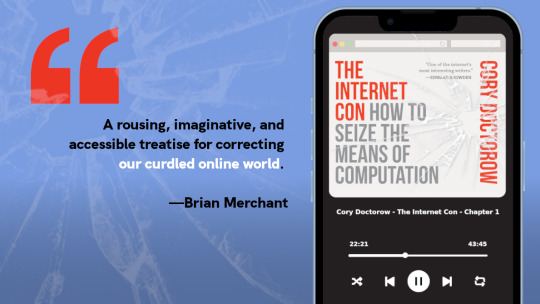
[Image ID: Nobody gets the internet-both the nuts and bolts that make it hum and the laws that shaped it into the mess it is-quite like Cory, and no one’s better qualified to deliver us a user manual for fixing it. That’s The Internet Con: a rousing, imaginative, and accessible treatise for correcting our curdled online world. If you care about the internet, get ready to dedicate yourself to making interoperability a reality. -Brian Merchant, author of Blood in the Machine]
It’s how Apple saved itself from Microsoft’s vicious campaign to destroy it:
https://www.eff.org/deeplinks/2019/06/adversarial-interoperability-reviving-elegant-weapon-more-civilized-age-slay
Every tech giant used interop to grow, and then every tech giant promptly turned around and attacked interoperators. Every pirate wants to be an admiral. When Big Tech did it, that was progress; when you do it back to Big Tech, that’s piracy. The tech giants used their monopoly power to make interop without permission illegal, creating a kind of “felony contempt of business model” (h/t Jay Freeman).
The Internet Con describes how this came to pass, but, more importantly, it tells us how to fix it. It lays out how we can combine different kinds of interop requirements (like the EU’s Digital Markets Act and Massachusetts’s Right to Repair law) with protections for reverse-engineering and other guerrilla tactics to create a system that is strong without being brittle, hard to cheat on and easy to enforce.
What’s more, this book explains how to get these policies: what existing legislative, regulatory and judicial powers can be invoked to make them a reality. Because we are living through the Great Enshittification, and crises erupt every ten seconds, and when those crises occur, the “good ideas lying around” can move from the fringes to the center in an eyeblink:
https://pluralistic.net/2023/06/12/only-a-crisis/#lets-gooooo

[Image ID: Thoughtfully written and patiently presented, The Internet Con explains how the promise of a free and open internet was lost to predatory business practices and the rush to commodify every aspect of our lives. An essential read for anyone that wants to understand how we lost control of our digital spaces and infrastructure to Silicon Valley’s tech giants, and how we can start fighting to get it back. -Tim Maughan, author of INFINITE DETAIL]
After all, we’ve known Big Tech was rotten for years, but we had no idea what to do about it. Every time a Big Tech colossus did something ghastly to millions or billions of people, we tried to fix the tech company. There’s no fixing the tech companies. They need to burn. The way to make users safe from Big Tech predators isn’t to make those predators behave better — it’s to evacuate those users:
https://pluralistic.net/2023/07/18/urban-wildlife-interface/#combustible-walled-gardens
I’ve been campaigning for human rights in the digital world for more than 20 years; I’ve been EFF’s European Director, representing the public interest at the EU, the UN, Westminster, Ottawa and DC. This is the subject I’ve devoted my life to, and I live my principles. I won’t let my books be sold with DRM, which means that Audible won’t carry my audiobooks. My agent tells me that this decision has cost me enough money to pay off my mortgage and put my kid through college. That’s a price I’m willing to pay if it means that my books aren’t enshittification bait.
But not selling on Audible has another cost, one that’s more important to me: a lot of readers prefer audiobooks and 9 out of 10 of those readers start and end their searches on Audible. When they don’t find an author there, they assume no audiobook exists, period. It got so bad I put up an audiobook on Amazon — me, reading an essay, explaining how Audible rips off writers and readers. It’s called “Why None of My Audiobooks Are For Sale on Audible”:
https://pluralistic.net/2022/07/25/can-you-hear-me-now/#acx-ripoff
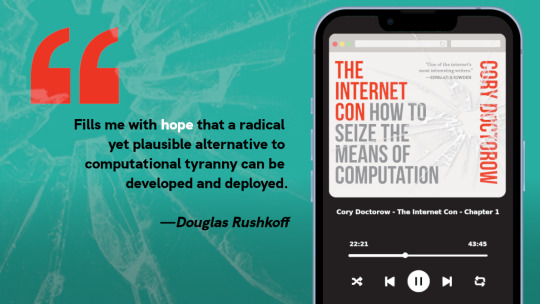
[Image ID: Doctorow has been thinking longer and smarter than anyone else I know about how we create and exchange value in a digital age. -Douglas Rushkoff, author of Present Shock]
To get my audiobooks into readers’ ears, I pre-sell them on Kickstarter. This has been wildly successful, both financially and as a means of getting other prominent authors to break up with Amazon and use crowdfunding to fill the gap. Writers like Brandon Sanderson are doing heroic work, smashing Amazon’s monopoly:
https://www.brandonsanderson.com/guest-editorial-cory-doctorow-is-a-bestselling-author-but-audible-wont-carry-his-audiobooks/
And to be frank, I love audiobooks, too. I swim every day as physio for a chronic pain condition, and I listen to 2–3 books/month on my underwater MP3 player, disappearing into an imaginary world as I scull back and forth in my public pool. I’m able to get those audiobooks on my MP3 player thanks to Libro.fm, a DRM-free store that supports indie booksellers all over the world:
https://blog.libro.fm/a-qa-with-mark-pearson-libro-fm-ceo-and-co-founder/
Producing my own audiobooks has been a dream. Working with Skyboat Media, I’ve gotten narrators like @wilwheaton, Amber Benson, @neil-gaiman and Stefan Rudnicki for my work:
https://craphound.com/shop/

[Image ID: “This book is the instruction manual Big Tech doesn’t want you to read. It deconstructs their crummy products, undemocratic business models, rigged legal regimes, and lies. Crack this book and help build something better. -Astra Taylor, author of Democracy May Not Exist, but We’ll Miss It When Its Gone”]
But for this title, I decided that I would read it myself. After all, I’ve been podcasting since 2006, reading my own work aloud every week or so, even as I traveled the world and gave thousands of speeches about the subject of this book. I was excited (and a little trepedatious) at the prospect, but how could I pass up a chance to work with director Gabrielle de Cuir, who has directed everyone from Anne Hathaway to LeVar Burton to Eric Idle?
Reader, I fucking nailed it. I went back to those daily recordings fully prepared to hate them, but they were good — even great (especially after my engineer John Taylor Williams mastered them). Listen for yourself!
https://archive.org/details/cory_doctorow_internet_con_chapter_01
I hope you’ll consider backing this Kickstarter. If you’ve ever read my free, open access, CC-licensed blog posts and novels, or listened to my podcasts, or come to one of my talks and wished there was a way to say thank you, this is it. These crowdfunders make my DRM-free publishing program viable, even as audiobooks grow more central to a writer’s income and even as a single company takes over nearly the entire audiobook market.
Backers can choose from the DRM-free audiobook, DRM-free ebook (EPUB and MOBI) and a hardcover — including a signed, personalized option, fulfilled through the great LA indie bookstore Book Soup:
https://www.kickstarter.com/projects/doctorow/the-internet-con-how-to-seize-the-means-of-computation
What’s more, these ebooks and audiobooks are unlike any you’ll get anywhere else because they are sold without any terms of service or license agreements. As has been the case since time immemorial, when you buy these books, they’re yours, and you are allowed to do anything with them that copyright law permits — give them away, lend them to friends, or simply read them with any technology you choose.
As with my previous Kickstarters, backers can get their audiobooks delivered with an app (from libro.fm) or as a folder of MP3s. That helps people who struggle with “sideloading,” a process that Apple and Google have made progressively harder, even as they force audiobook and ebook sellers to hand over a 30% app tax on every dollar they make:
https://www.kickstarter.com/projects/doctorow/red-team-blues-another-audiobook-that-amazon-wont-sell/posts/3788112
Enshittification is rotting every layer of the tech stack: mobile, payments, hosting, social, delivery, playback. Every tech company is pulling the rug out from under us, using the chokepoints they built between audiences and speakers, artists and fans, to pick all of our pockets.
The Internet Con isn’t just a lament for the internet we lost — it’s a plan to get it back. I hope you’ll get a copy and share it with the people you love, even as the tech platforms choke off your communities to pad their quarterly numbers.

Next weekend (Aug 4-6), I'll be in Austin for Armadillocon, a science fiction convention, where I'm the Guest of Honor:
https://armadillocon.org/d45/

If you'd like an essay-formatted version of this thread to read or share, here's a link to it on pluralistic.net, my surveillance-free, ad-free, tracker-free blog:
https://pluralistic.net/2023/07/31/seize-the-means-of-computation/#the-internet-con

[Image ID: My forthcoming book 'The Internet Con: How to Seize the Means of Computation' in various editions: Verso hardcover, audiobook displayed on a phone, and ebook displayed on an e-ink reader.]
#pluralistic#trustbusting#big tech#gift guide#kickstarter#the internet con#books#audiobooks#enshitiffication#disenshittification#crowdfunders#seize the means of computation#audible#amazon#verso
15K notes
·
View notes
Text
"The Euro-Med Human Rights Monitor said that the massacre at al-Shifa was one of the largest in Palestinian history, estimating that at least 1,500 people had been killed, injured, or reported missing, “with women and children making up half of the casualties.”* The organization also confirms that at least 22 patients were shot while in their hospital beds, while the number of displaced persons sheltering at the hospital who were forced to evacuate southward was estimated to include 25,000 people. Moreover, 1,200 housing units in the vicinity of al-Shifa were destroyed.
Despite the army’s claims about the al-Shifa operation’s strategic and military importance and the number of alleged Hamas and PIJ members it had arrested and killed, it obfuscated the real intended purpose of the operation, which was to destroy the health system in northern Gaza and worsen the already disastrous humanitarian conditions. The entire compound is now unfit for use. Even the morgue, containing countless bodies of the slain, was burned down."
3K notes
·
View notes
Text
[...] During the early stages of the war, the army gave sweeping approval for officers to adopt Lavender’s kill lists, with no requirement to thoroughly check why the machine made those choices or to examine the raw intelligence data on which they were based. One source stated that human personnel often served only as a “rubber stamp” for the machine’s decisions, adding that, normally, they would personally devote only about “20 seconds” to each target before authorizing a bombing — just to make sure the Lavender-marked target is male. This was despite knowing that the system makes what are regarded as “errors” in approximately 10 percent of cases, and is known to occasionally mark individuals who have merely a loose connection to militant groups, or no connection at all.
Moreover, the Israeli army systematically attacked the targeted individuals while they were in their homes — usually at night while their whole families were present — rather than during the course of military activity. According to the sources, this was because, from what they regarded as an intelligence standpoint, it was easier to locate the individuals in their private houses. Additional automated systems, including one called “Where’s Daddy?” also revealed here for the first time, were used specifically to track the targeted individuals and carry out bombings when they had entered their family’s residences.
In case you didn't catch that: the IOF made an automated system that intentionally marks entire families as targets for bombings, and then they called it "Where's Daddy."
Like what is there even to say anymore? It's so depraved you almost think you have to be misreading it...
“We were not interested in killing [Hamas] operatives only when they were in a military building or engaged in a military activity,” A., an intelligence officer, told +972 and Local Call. “On the contrary, the IDF bombed them in homes without hesitation, as a first option. It’s much easier to bomb a family’s home. The system is built to look for them in these situations.”
The Lavender machine joins another AI system, “The Gospel,” about which information was revealed in a previous investigation by +972 and Local Call in November 2023, as well as in the Israeli military’s own publications. A fundamental difference between the two systems is in the definition of the target: whereas The Gospel marks buildings and structures that the army claims militants operate from, Lavender marks people — and puts them on a kill list.
In addition, according to the sources, when it came to targeting alleged junior militants marked by Lavender, the army preferred to only use unguided missiles, commonly known as “dumb” bombs (in contrast to “smart” precision bombs), which can destroy entire buildings on top of their occupants and cause significant casualties. “You don’t want to waste expensive bombs on unimportant people — it’s very expensive for the country and there’s a shortage [of those bombs],” said C., one of the intelligence officers. Another source said that they had personally authorized the bombing of “hundreds” of private homes of alleged junior operatives marked by Lavender, with many of these attacks killing civilians and entire families as “collateral damage.”
In an unprecedented move, according to two of the sources, the army also decided during the first weeks of the war that, for every junior Hamas operative that Lavender marked, it was permissible to kill up to 15 or 20 civilians; in the past, the military did not authorize any “collateral damage” during assassinations of low-ranking militants. The sources added that, in the event that the target was a senior Hamas official with the rank of battalion or brigade commander, the army on several occasions authorized the killing of more than 100 civilians in the assassination of a single commander.
. . . continues on +972 Magazine (3 Apr 2024)
#free palestine#palestine#gaza#israel#ai warfare#this is only an excerpt i hope you'll at least skim through the rest of the piece#there's an entire section on the 'where's daddy' system#(seriously just typing the name out feels revolting)
3K notes
·
View notes
Text

Have you heard about the Polish Train company, Newag, and the bullshit it turns out they got up to?
So, the regional rail operator Koleje Dolnośląskie bought some Newag Impuls back in 2016 . In late 2021, some of them need to have major maintenance done, as they've been in service a while. So the company SPS (Serwis Pojazdów Szynowych) gets the contract to fix them. They basically take the train apart, replace a bunch of it, following all the rules in the documentation Newag gave them, and... it won't move. The train says everything is fine, the brakes are off, there's plenty of power, but you push the throttle up and it won't move.
SPS spends a while trying to figure out what the fuck is wrong, with no luck. So they hire some hackers from the Polish security group Dragon Sector. Dragon Sector figures out how to get into the code of the computer system that runs the train, and OH MY GOD.
So it turns out there's a secret train-lock system. If it's on, the train won't move. This will be triggered in some situations you might think are normal: the clocks are wrong, the serial numbers of the various parts have changed, and a firmware mismatch between the main computer and the power system. Now, the fact that it makes sense to not run the train in these situations until someone can check it? that doesn't extend to the fact the train uses a SECRET lock system, rather than just popping up an error message telling you what's wrong. There's also the problem that while these are all potential error problems, they can't be cleared by anyone with the technical manuals, which are supposed to cover everything about how to run these trains. Only Newag themselves can reset this system.
Which, you know, keeps SPS from properly fixing them. Only Newag can fix them now, but not because SPS lacks any technical ability, but because Newag sabotaged their own trains. But don't worry: it gets worse.
So now that Dragon Sector knows what's happening, they get to look at other trains. It turns out the trains aren't all running the same software, and there are other tricks in there.
One of them is a "how long has the train been stopped?" check. If the train hasn't hit 60 km/h in 10 days, the train locks itself and won't move until Newag can clear it. So, like, if a train is ever out of service, like it's going to a repair place... it'll break itself. Unless the repair place is owned by Newag.
But two of the trains go further: See, these trains have GPS built in, right? You may be able to guess where this is going...

THEY JUST MAKE THE TRAIN CHECK IF IT IS PARKED AT THEIR COMPETITORS' REPAIR YARD AND BREAK ITSELF IF IT WAS.
The sheer audacity of this move. This is frighteningly bullshit anti-competition self-sabotage.
This has, obviously, made some parts of the Polish government to start investigating this. Newag may be (and hopefully will be) in a lot of trouble.
For more info, there's a great video of a presentation by the three people from Dragon Sector who did the hacking, which was presented at the 37th Chaos Communication Congress in Germany.
Ars Technica also has an article on it, but it predates the presentation so it doesn't have some of the later details.
Anyway, the good news is that in the end the hackers at Dragon Sector were able to unlock most of the trains: A few had additional trickery that they didn't want to hack around, because it might break the train's certification. For the others, they discovered undocumented "cheat codes" in the software that they could use to bypass the secret lockouts... presumably the same ones that Newag would have used when they "repaired" trains.
4K notes
·
View notes
Text
Oh dear.
So as some of you may know, I love to point and laugh at bad legal arguments. And as fun as legal dumpster fires are when they are made by people who aren’t lawyers but think this whole “law” thing seems pretty simple, it’s even funnier when an actual, barred attorney is the person dumping gallons of kerosene into the dumpster.
And oh boy folks, do I have a fun ride for y’all today. Come with me on this journey, as we watch a lawyer climb into the dumpster and deliberately pour kerosene all over himself, while a judge holds a match over his head.
The court listener link is here, for those who want to grab a few bowls of popcorn and read along.
For those of you who don’t enjoy reading legal briefs for cases you aren’t involved with on your day off (I can’t relate), I will go through the highlights here. I will screenshot and/or paraphrase the relevant portion of the briefs, and include a brief explainer of what’s going on (and why it’s very bad, but also extremely funny). (Also, I’m not going to repeat this throughout the whole write-up, so for the record: any statements I make about how the law or legal system works is referring exclusively to the U.S. (And since this is a federal case, we are even more specifically looking at U.S. federal law.) Also, I don’t know how you could construe any of this to be legal advice, but just in case: none of this is, is intended to be, or should be taken as, legal advice.)
First, let’s get just a quick background on the case, to help us follow along. In brief, this is a civil tort suit for personal injury based on defendant’s (alleged) negligence. The plaintiff is suing the defendant (an airline), because he says that he was injured when a flight attendant struck his knee with a metal cart, and the airline was negligent in letting this happen. The airline filed a motion to dismiss on the grounds that there is an international treaty that imposes a time bar for when these kind of cases can be brought against an airline, and the plaintiff filed this case too many years after the incident.
The fun begins when the plaintiff’s attorney filed an opposition to the motion to dismiss. (So far, a good and normal thing to do.) The opposition argues that the claim is not time-barred because 1) the time bar was tolled by the defendant’s bankruptcy proceedings (that is, the timer for the time limitation was paused when the defendant was in bankruptcy, and started again afterwords), and 2) the treaty’s time limit doesn’t apply to this case because the case was filed in state court before the state statute of limitations expired, and the state court has concurrent jurisdiction over this kind of case.
I’m struggling a bit to succinctly explain the second reason, and there’s a reason for that.
You see, the whole opposition reads a bit…oddly.
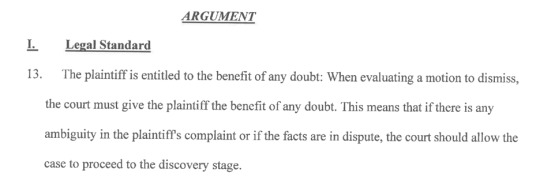
This is how the opposition begins its argument, and it’s…weird. The basic principle is...mostly correct here, but the actual standard is that when reviewing a motion to dismiss for failure to state a claim (which is what the defendant filed) the court must draw all reasonable factual inferences in the plaintiff’s favor. But even then, you don’t just put that standard in your opposition. You cite to a case that lays out the standard.
Because that’s how courts and the law work. The courts don’t operate just based on vibes. They follow statutory law (laws made by legislature) and case law (the decisions made by courts interpreting what those laws mean). You don't just submit a filing saying, "here's what the law is," without citing some authority to demonstrate that the law is what you say (or are arguing) it is.
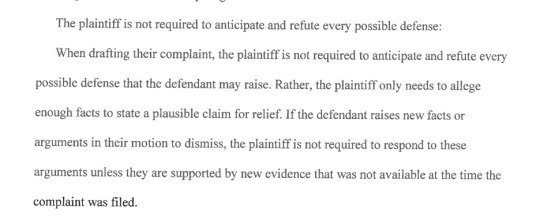
Again, this isn’t wrong (although I'm not sure what it means by new arguments?), but it’s weird! And part of the reason it’s weird is that it is irrelevant to the defendant’s motion to dismiss. The defendant filed a motion stating that based on the facts in the complaint, the plaintiff has not stated a claim based on which relief can be granted, because the complaint is time barred by a treaty. There is no reason for this language to be in the opposition. It’s almost like they just asked a chatbot what the legal standards are for a motion to dismiss for a failure to state a claim, and just copied the answer into their brief without bother to double-check it.
The opposition then cites a bunch of cases which it claims support its position. We will skip them for now, as the defendant will respond to those citations in its reply brief.
The last thing in the brief is the signature of the lawyer who submitted the brief affirming that everything in the brief is true and correct. An extremely normal - required, even! - thing to do. This will surely not cause any problems for him later.

The next relevant filing is the defendant’s reply brief. Again, the existence of a reply brief in response to an opposition is extremely normal. The contents of this brief are…less so.

Beg pardon?
Just to be clear, this is not normal. It is normal to argue that the plaintiff’s cases are not relevant, or they aren’t applicable to this case, or you disagree with the interpretations, or whatever. It is not normal for the cases to appear to not exist.
Some highlights from the brief:
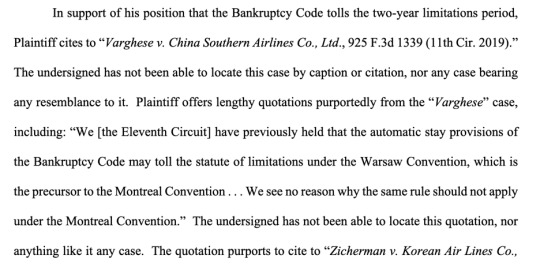

Quick lesson in how to read U.S. case citations! The italicized (or underlined) part at the beginning is the name of the case. If it is a trial court case, the plaintiff is listed first and the defendant second; if the case has been appealed, the person who lost at the lower court level (the petitioner/appellant) will be listed first, and the person who won at the lower level (the respondent/appellee) will be listed second. There are extremely specific rules about which words in these names are abbreviated, and how they are abbreviated. Next, you list the volume number and name of the reporter (the place where the case is published), again abbreviated according to very specific rules, then the page number that the case starts on. If you are citing a case for a specific quote or proposition, you then put a comma after the beginning page number, and list the page number(s) on which the quote or language you are relying on is located (this is called a “pincite”). Finally, you put in parenthesis the name of the court (if needed)(and again, abbreviated according to extremely specific rules) and the year the case was decided.
So the plaintiff’s response cited to Zicherman, which they said was a case from 2008 that was decided by the 11th Circuit Court of Appeals. However, the defendant was not able to find such a case. They were able to find a case with the same name (the same petitioner and respondent), but that case was decided by the U.S. Supreme Court in 1996, and the lower court cases associated with that case weren’t in the 11th circuit either. (The United States Reports is the only official reporter for the U.S. Supreme Court, and only includes SCOTUS decisions, so it’s not necessary to include the name of the court before the year it was decided.)

Just to be clear. The defendant’s brief is saying: the plaintiff cited and extensively quoted from these cases, and neither the cases nor the quotations appear to exist. These “cases” were not ancillary citations in the plaintiff’s brief. They were the authority it relied upon to make its arguments.
This is as close a lawyer can come, at this point in the proceedings, to saying, “opposing counsel made up a bunch of fake cases to lie to the court and pretend the law is something different than it is.”


That, “Putting aside that here is no page 598 in Kaiser Steel,” is delightfully petty lawyer speak for, “you are wrong on every possible thing there is to be wrong about.”
By page 5, the defendant has resorted to just listing all of the (apparently) made up cases in a footnote:


(skipping the citations to support this proposition)

This is where I return to my struggle to explain the opposition’s second reason why the motion to dismiss should not be granted. I struggled to explain the argument, because they failed to explain why the argument they were making (that plaintiffs can bring lawsuits against airlines in state court, and the state court have specific statutes of limitations for general negligence claims) was relevant to the question of whether the plaintiff’s specific claim against the airline was time barred by the treaty. Because 1) this case is in federal court, not state court, and 2) federal law - including treaties - preempts state law. Again, it’s almost like plaintiff’s attorney just typed a question about the time bar into a chatbot or something, and the machine, which wasn’t able to reason or actually analyze the issues, saw a question about the time to bring a lawsuit and just wrote up an answer about the statute of limitations.
We also end with a nice little lawyerly version of “you fucked up and we are going to destroy you.” The relief requested in the defendant’s original motion to dismiss was:

In their reply to the opposition, however:

“The circumstances” in this case, being the apparent fabrication of entire cases. Because courts tend to take that pretty seriously.
And the court took it seriously indeed. The defendant’s reply was docketed on March 15th of this year. On April 11th:

AKA: you have one week (an extremely prompt time frame for federal court) to prove to me that you didn’t just make up these cases.
On April 12th, the plaintiff’s attorney requests more time because he’s on vacation:

The judge grants the motion, but adds in another case that he forgot to include in his first order.
On April 25th, the plaintiff’s attorney files the following:

(And he lists the cases, with one exception, which he says is an unpublished decision.)
But he says of all of the cases except two, that the opinions…

Which is…nonsense?
First of all: if you cited a case, you had to get it from somewhere. Even unpublished opinions, if you are citing them in a brief, you are citing them because you pulled them off of westlaw or whatever. Which means you have access to the case and can annex it for the court. (There are even formal rules for how you cite unpublished opinions! And those rules include citing to where you pulled the damn case from!)
Secondly: remember that long digression I went into about how to read case citations? Remember that bit about how you include the name of the reporter (the place the case was published)? Yes, cases are published. They are printed in physical books, and they are published online in databases (e.g. lexis or westlaw). If the specific online database you are looking in does not have the case, you look somewhere else. If you have a judge telling you to get them a copy of the case Or Else, you track down a physical copy of the reporter if you need to and scan the damn thing yourself. You - literally - can’t just not have a copy of the case! (Especially published federal circuit court opinions, which multiple of these cases are! Those aren’t hard to find!)
And what kind of “online database” doesn’t include the entire opinion anyway? I’ve literally never heard of a case research database that only included partial opinions, because that wouldn’t be useful.
Maybe if we look at the attached annexed copies of the cases, that might give us some answers.
...
My friends, these things are just bizarre. With two exceptions, they aren’t submitted in any sort of conventional format. Even if you’ve never seen a legal opinion before, I think you can see the difference if you just glance through the filings. They are located at Docket entry #29 on Court Listener (April 25, 2023). Compare Attachments 6 and 8 (the real cases submitted in conventional format) to the other cases. Turning to the contents of the cases:
In the first one, the factual background is that a passenger sued an airline, then the airline filed a motion to dismiss (on grounds unrelated to the treaty's time bar), then the airline went into bankruptcy, then the airline won the motion to dismiss, then the passenger appealed. And the court is now considering that appeal. But then the opinion starts talking about how the passenger was in arbitration, and it seems to be treating the passenger like he is the one who filed for bankruptcy? It’s hallucinatory, even before you get to the legal arguments. The “Court of Appeals” is making a ruling overruling the district court’s dismissal based on the time bar, but according to the factual background, the case wasn’t dismissed based on the time bar, but on entirely other grounds? Was there some other proceeding where the claim was dismissed as time barred, and it’s just not mentioned in the factual background? How? Why? What is happening? Also it says Congress enacted the treaty? But, no? That’s…that’s not how treaties work? I mean, Congress did ratify the treaty? But they didn’t unilaterally make it!
In the second case, there’s an extended discussion of which treaty applies to the appellants claims, which is bizarre because there are two relevant treaties, and one replaced the other before the conduct at issue, so only the new treaty applies? There isn’t any discussion of the issue beyond that basic principle, so there is no reason there should be multiple paragraphs in the opinion explaining it over and over? Also, it keeps referring to the appellant as the plaintiff, for some reason? And it includes this absolutely hallucinatory sentence:

…the only part this that makes sense is that the argument is without merit. I’m not going to discuss the actual merits of the legal arguments in the opinion, because they are so bizarre and disjointed that even trying to describe them would require a Pepe Silvia-sized conspiracy board. Like the previous case, both the facts and the legal posture of the case change constantly, with seemingly no rhyme or reason.
The third one…oh boy. First, large portions of the “opinion” are individual paragraphs with quotations around the whole paragraph. What’s happening there? As far as the content of the opinion itself - I can’t. I mean that, I literally can’t. What is being discussed seems to change from paragraph to paragraph, much of it contradicting. It makes the first case seem linear and rational by comparison. The court finds it doesn’t have personal jurisdiction over the defendant so dismisses the case based on a lack of subject matter jurisdiction? But also the defendant hasn’t contested jurisdiction? And also the court does hold that it has both subject matter and personal jurisdiction over the defendant? And then it denies the motion to dismiss the case? Also, at one point it cites itself?
…also, even if this was a real case, it doesn’t stand for the propositions the plaintiff cited it for in their opposition? I’m not going to go into the weeds (honestly it’s so hallucinatory I’m not sure I could if I tried), but, for example, the plaintiff’s reply brief states that the court held “that the plaintiff was not required to bring their claim in federal court.” The U.S. District Court for the District of Columbia is a federal court, and there is no discussion of any filings in state courts. The closest the “opinion” comes is with the statement, “Therefore, Petersen’s argument that the state courts of Washington have concurrent jurisdiction is unavailing.” (This statement appears to be completely disconnected from anything before or after it, so I am unsure what it is supposed to mean.)
Moving on, case number four is allegedly a decision by the Court of Appeals of Texas. It includes the following line:

Honestly, the plaintiff’s attorney best defense at this point is that he wasn’t intentionally trying to mislead the court, because if he was doing this on purpose, he would have edited the cases to make them slightly more believable. (Context in case you’ve lost track: these documents are supposed to be copies of the opinions he is citing. The screenshoted line makes it clear that what he is actually citing is, at best, someone else’s summary of an "opinion". It would be like if a teacher asked a student to photocopy a chapter of a book and bring it into class, and instead the student brought in a copy of the cliffs notes summary of that chapter. Except that the book doesn’t even exist.)
The actual contents of the “opinion” are, as is now standard, absolutely bonkers. First, the court decides that it doesn’t have personal jurisdiction over Delta because “Delta did not purposefully avail itself of the benefits of conducting business in Texas.” This was despite the fact that the factual background already included that the appellant (sorry, the plaintiff, according to the “opinion”) flew on a Delta flight originating in Texas. Like, this is just wrong? It’s not even hallucinatory nonsense, it’s just facially incorrect legal analysis. Then the court starts discussing the treaty’s time bar, for some reason? Then it goes back to talking about personal jurisdiction, but now the trial court denied the defendant’s motion to dismiss for lack of personal jurisdiction, and the appellate court agrees with the trial court that it does have personal jurisdiction, even though this is the plaintiff’s appeal from the dismissal for lack of personal jurisdiction and the court already ruled it didn’t have personal jurisdiction? And even though on page 1, the plaintiff was injured during a flight from Texas to California, now on page 7 she was injured on a flight from Shanghai to Texas? Also the trial court has gone back in time (again) to grant the motion to dismiss that it previously denied?
Also, I’ve been trying to avoid pointing out the wonky text of these submissions, but:

Everything ok there?
Case number five is similar enough to number four that it’s not worth repeating myself.
Thank god, cases six and eight, as noted above, are real cases, so I’m going to skip them. The defendant alleges that the cases do not stand for the propositions the plaintiff cited them for, and I’m going to assume that is true, given the rest of this nonsense.
Case number seven looks legitimate on the surface. But neither the defendant nor I could find the case through any legitimate search mechanisms. The defendant looked up the purported docket numbers on PACER and found completely different cases; I was able to find a case with the name “Miller v. United Airlines, Inc.,” but it was for a different Ms. Miller, it was a California state case (not a Second Circuit federal case), it was decided on a different year, and the substance of the case was entirely different from the alleged opinion filed with the court.
On top of that, this might be the most morally reprehensible fake citation of them all? Because it is about the crash of United Airlines Flight 585, a real plane crash. Everyone on board - 25 people in total - was killed.
The individual cited in this fake court case was not one of them.
I cannot imagine conducting myself in such a way where I would have to explain to a judge that I made up a fake case exploiting a real tragedy because I couldn’t be bothered to do actual legal research.
Now, I know you all have figured out what’s going on by now. And I want you to know that if your instincts are saying, “it seems like the lawyer should have just fallen on his sword and confessed that he relied on ChatGPT to write his original brief, rather than digging himself further into this hole”? Your instincts are absolutely correct.
Because obviously, the court was having none of this b.s. On May 4th, the court issued an order, beginning with the following sentence:

That is one of the worst possible opening sentences you can see in an order by the court in a situation like this. The only thing worse is when judges start quoting classic literature. If I was Mr. Peter LoDuca, counsel for the plaintiff, I would already be shitting my pants.
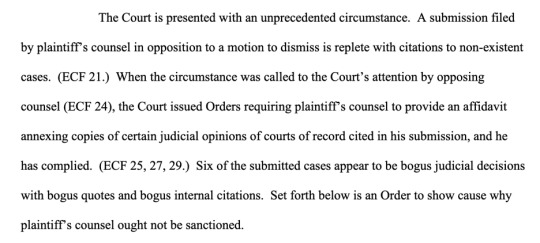
“I gave you an opportunity to either clear things up or come clean. Now I’m going to give you an opportunity to show why I should only come down on you like a pile of brinks, instead of a whole building.”

We are getting dangerously close to “quoting classic lit” territory here.
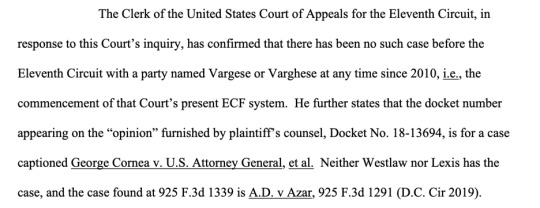
If I learned that the judge in my case called up the clerk of a circuit court just to confirm how full of shit I was, I would leave the legal profession forever. Also, the judge is now also putting quotes around “opinion.” When judges start getting openly sarcastic in their briefs, that means very very bad things are about to happen to someone.

So I’m guessing the delay between this filing and the court order was because the judge’s clerk was tasked with running down every single one of the additional fake citations included in the "opinions", just to make this sure this order (and the upcoming pile of bricks) are as thorough as possible.
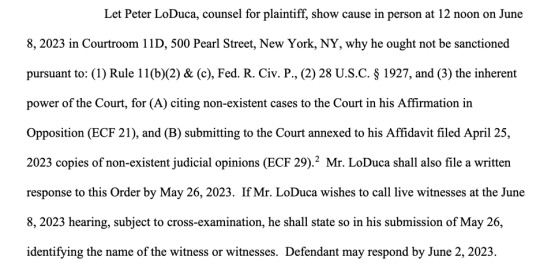
If you are following along with Dracula Daily, the vibe here is roughly the same as the May 19th entry where Dracula demands Jonathan Harker write and pre-date letters stating he has left the castle and is on the way home.
Also, hey, what’s that footnote?

Wait, what?

Folks, it appears we may have notary fraud, on top of everything else! Anybody have bingo?
So on May 25, one day before the deadline, Mr. LoDuca filed his response. And oh boy, I hope ya’ll are ready for this.
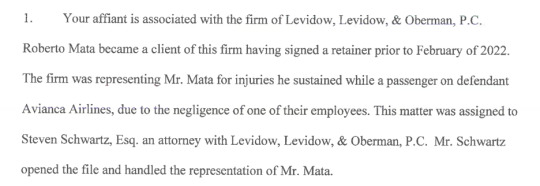
Hey, what’s the name of that other attorney, “Steven Schwartz”? Where have I seen that name before…
...I ran out of room for images on this post. So I'm going to have to leave this as an accidental cliffhanger. Part 2 to follow once I refresh my tea.
9K notes
·
View notes
Text
I know this is the Take Personal Responsibility for Systemic Issues website, but I keep seeing weirdly guilt trippy posts about libraries and ebook licenses, which are a labyrinth from hell and not actually something you personally need to feel guilty about. here are a few facts about ebook licenses you may not know:
in Libby/Overdrive, which currently operates in most US public libraries, ebook licenses vary widely in how much they cost and what their terms are. some ebooks get charged per use, some have a set number of uses before the license runs out, and others have a period of time they're good for (usually 1-2 years) with unlimited checkouts during that period before they expire. these terms are set by the publisher and can also vary from book to book (for instance, a publisher might offer two types of licenses for a book, and we might buy one copy of a book with a set number of uses we want to have but know won't move as much, and another copy with a one year unlimited license for a new bestseller we know will be really moving this year.)
you as a patron have NO way of knowing which is which.
ebook licenses are very expensive compared to physical books! on average they run about 60 bucks a pop, where the same physical book would cost us $10-15 and last us five to ten years (or much longer, if it's a hardcover that doesn't get read a lot.)
if your library uses Hoopla instead, those are all pay per use, which is why many libraries cap checkouts at anywhere between 2-10 per month.
however.
this doesn't mean you shouldn't use ebooks. this doesn't mean you should feel guilty about checking things out! we buy ebook licenses for people to use them, because we know that ebook formats are easier for a lot of people (more accessible, more convenient, easier for people with schedules that don't let them get into the library.) these are resources the library buys for you. this is why we exist. you don't need to feel guilty about using them!
things that are responsible for libraries being underfunded and having to stretch their resources:
government priorities and systemic underfunding of social services that don't turn a profit and aren't easily quantified
our society's failure to value learning and pleasure reading for their own sake
predatory ebook licensing models
things that are not responsible for libraries being underfunded:
individual patron behavior
I promise promise promise that your personal library use is not making or breaking your library's budget. your local politicians are doing that. capitalism is doing that. you are fine.
(if you want to help your local library, the number one thing you can do is to advocate for us! talk to your city or county government about how much you like the library. or call or write emails or letters. advocate for us locally. make sure your state reps know how important the library is to you. there are local advocacy groups in pretty much every state pushing for library priorities. or just ask your local librarian. we like to answer questions!
also, if you're in Massachusetts, bill h3239 would make a huge difference in letting us negotiate ebook prices more fairly. tell your rep to vote for it!)
#like. the nypl budget is getting cut bc Adams doesnt think the library matters!#your checking out a book a few times bc you didn't get to it in time is not actually affecting Mr. Cops Not Books#library haint#if you like the library and you like free stuff come use the library. you might be surprised about what we have!#but it's not a moral act either way.#libraries are a public good! i love the library! but so is the post office. we don't moralize about the post office.#ANYWAY.#local librarian with tendencies towards scrupulosity gets frustrated online more news at 10
4K notes
·
View notes
Text
In recent posts I've complained that a lot of tabletop RPGs which toss around the term "fiction first" don't actually understand what it means, and I've been asked to expand on that complaint. So:
In my experience, there are two ways that game texts which want to position themselves as "fiction first" trip themselves up, one obvious and one subtle.
The first and more obvious pitfall is treating "fiction first" as an abstract ideology. They're using "fiction first" as a synonym for "story over rules" in a way that calls back to the role-playing-versus-roll-playing discourse of the early 2000s. The trouble is, now as then, nobody can usefully explain what "story over rules" actually entails. At best, they land on a definition of "fiction first" that talks about the GM's right to ignore the rules to better serve the story, which is no kind of definition at all – it's just putting a funny hat on the Rule Zero fallacy and trying to pass it off as some sort of totalising ideology of play.
A more useful way of defining "fiction first" play is to think of it not in terms of whether you engage with the rules at all, but in terms of when they're invoked: specifically, as a question of order of operations.
Suppose, for example, that you're playing Dungeons & Dragons, and you pick up the dice and say "I attack the dragon". Some critics would claim that no actual narrative has been established – that this is simply a bare invocation of game mechanics – but in fact we can infer a great deal: your character is going to approach the dragon, navigating any inclement terrain which lies between them, and attempt to kill the dragon using the weapon they're holding in their hand. The rules are so tightly bound to a particular set of narrative circumstances that simply invoking those rules lets us work backwards to determine what the context and stakes must be for that invocation of the rules to be sensical; this, broadly speaking, is what "rules first" looks like.
Conversely, let's say that your game of Dungeons & Dragons has confronted you with a pit blocking your path, and you want to make an Athletics check to cross it. At this point the GM is probably going to stop you and say, hold up, tell us what that looks like. Are you trying to jump across it? Are you trying to climb down one wall of the pit and up the other? Are you trying to tie a rope to the halfling and toss them to the other side? In other words, before you can pick up the dice, you need to have a little sidebar with the GM to hash out what the narrative context is, and to negotiate what can be achieved and what's at stake if you mess it up; this, broadly, is what "fiction first" looks like.
At this point I know some people are thinking "wait, hold on – both of those examples were from Dungeons & Dragons; are you saying that Dungeons & Dragons is both a rules-first game and a fiction-first game?" And yeah, I am. That's the second, more subtle place where game texts that talk about "fiction first" go astray: they talk about it as though being "fiction first" or "rules first" is something which is inherent to game systems as a whole.
This is not in fact true: being "fiction first" or "rules first" is something which describes particular invocations of the rules. In practice, only very simple games spend all of their time in one mode or the other; most will switch back and forth at need. Generally, most "traditional" RPGs (i.e., the direct descendants of Dungeons & Dragons and its various imitators) tend to operate in rules-first mode in combat and fiction-first mode out of it, though this is a simplification – when and how such mode-switching occurs can be quite complex.
Like any other design pattern, "fiction first" mechanics are a tool that's well suited for some jobs, and ill suited for others. Sometimes your rules are fine-grained enough that having an explicit negotiation and stakes-setting phase would just be adding extra steps. Sometimes you're using the outputs of the rules a narrative prompt, and having to pin the context down ahead of time would defeat the purpose. Fortunately, you don't have to commit yourself to one approach or the other; as long as your text is clear about how you're assuming a given set of rules toys will be used, you can switch modes as need dictates. However, you're not going to be capable of that kind of transparency if you're thinking in terms of "this a Fiction First™ game".
(Incidentally, this is why it can be hard to talk about "fiction first" with OSR fans if you're being dogmatic about fiction-first framing being an immutable feature of particular games. Since traditional RPGs tend to observe the above-described rules-first-in-combat, fiction-first-out-of-combat division, and OSR games tend to treat actually getting into a fight as a strategic failure state, a lot of OSR games spend most of their time in fiction-first mode. If you go up to an OSR fan and insist that D&D-style games can never be fiction-first, then attempt to define "fiction first" for them and proceed to describe how they usually play, they'll quite justifiably conclude that you have your head up your ass!)
#gaming#tabletop roleplaying#tabletop rpgs#game design#fiction first#violence mention#death mention#swearing
2K notes
·
View notes
Text
you don't have to pay overdraft fees ever
the biden administration recently cracked down on overdraft fees which means banks cannot force you to pay them as they have become opt-in -- however you do have to call the bank (for example, paypal payments overdraft you even if you have opted out, as they function like checks.)
my experience is with wellsfargo but i imagine that most major banks may operate similarly:
if you have an overdraft fee, call the bank, you will get a machine. go through the autentification process with it but do not mention your issue when it asks you to (specially not the word overdraft -- this is a conspiracy theory i cannot prove but i swear to god they rewire you to more aggressive phone people if you tipoff the machine) instead say "i'd like to speak to a representative" the machine will be like "lol didn't get that" so you may need to repeat it a couple more times before it wires you to a real person
wait! i'd recomend calling as early in the morning as possible to avoid elevator music.
be nice to the customer service person who picks up (i make a point of thanking them for their help and calling them by their name, if i don't catch it the first time i ask them again for it)
my script is something along the lines of: "hi, i noticed there's an overdraft fee in my account that posted on [date]. i am calling to see if we (WE -- you and the representative are a team against the problem) could do something about it" (<- you may decide to be more direct, i just put my innocent hat on)
most if not all of what they say to you is a script. they will be like "i will check that for you with the automated process that takes into account you previous refund activity" BLAH BLAH BLAH. more waiting. if you have had any refunds in the past 12 months, they will be like "sorry the system says no (:" THOUGH, VERY RECENTLY, they have tacked on this question: do you have any thoughts on that / how do you feel about that / etc. though even if they do not prompt you, here's the next step:
say: thank you! i appreciate the automated review, however i do not agree/approve/consent to being charged a fee. is there any way you could check again / anyone else i could talk to / would it be possible to refund it regardless? etc.
they will check again, possibly more waiting, and then you will get an immediate refund! in the rare case they refuse to, here is the link to the FDIC website that you can refer to (note, this is for overdraft fees only):

8. i cannot emphasize this enough -- be nice !!!!!!!!!!! BE NICE! be cheerful, say "thank you" and "no worries" and "take your time!". it is NOT a confrontation, it is NOT their fault, and most of the time the customer service representative wants this to be as frictionless as possible. they are helping you, use the opportunity to make a moment of their day a lot less stressful than they expect it to be.
that is ALL -- i have been using wellsfargo for over eight years, and have lost hundreds of dollars to predatory overdraft fees charged as a punishment for having no money.
during the beginning covid, when they were momentarily suspended (you had to mention covid on the phone to get them back lol), i came to the realization that all of this time they could have been giving me my money back. there was no reason not to, except corporate greed.
do not let phone social anxiety let them take your money from you, now that it is easier than EVER to get it back. and if you need motivation to pick up the phone, remember this headline from a couple of years back lol:

DEATH TO CAPITALISM !!!!!!
17K notes
·
View notes